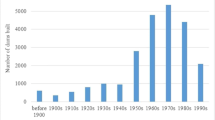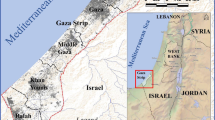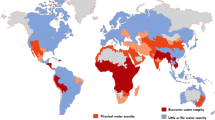Abstract
Karkheh river basin in the southwest of Iran will contain 40 dams with 8326 million cubic meters (MCM) storage volume, of which seven will produce hydro-energy according to the water master plan of Karkheh river basin (KRB). Non-integrated upstream development and water allocation in Karkheh river basin, construction of large dams and climate change will change the operation conditions of the KRB system in developed stages. The focus of this paper is to assess the impact of these new conditions on the KRB system performance if current policy is followed and also how coordinated multi-reservoir operation can adjust and reduce the negative impacts on this system. Informing the water and energy-sector decision-makers about the KRB system performance if current practice or coordinated operation is adopted will be the objective of this paper. A basin-wide hydro-system multi-reservoir operation optimization model is developed to model the dams’ coordinated operation, water allocation and their spatial–temporal interactions, while minimizing the slacks in supplying water and energy demand targets. A basin-wide multi-reservoir system model is developed to simulate the current practice. Several scenarios of climate change and upstream water allocation are considered and evaluated. Six main dams with storage volume greater than 1600 MCM are considered and analyzed using the optimization and simulation model. The results show that irrigation water supply to Karkheh downstream reliability drops to 3% if current practices are followed when all the system is developed, while by the coordination, the reliability increases just to 21%. As expected, the coordinated operation of the system shows less deviation in comparison with current practice. In addition, the reservoir operation coordination in KRB system can increase the water supply by 20%, energy production by 5% and inflow to the Hoor-Al-Azim wetland by 50% in comparison with current practice reservoir operation.













Similar content being viewed by others
References
Abrishamchi A, Jamali S, Madani K, Hadian S (2012) Climate change and hydropower in Iran’s Karkheh River Basin. In: World environmental and water resources congress 2012: crossing boundaries, pp 3341–3349
Antonellini M, Dentinho T, Khattabi A, Masson E, Mollema PN, Silva V, Silveira P (2014) An integrated methodology to assess future water resources under land use and climate change: an application to the Tahadart drainage basin (Morocco). Environ Earth Sci 71(4):1839–1853
Ardakanian R (2005) Optimizing the coordination of hydro and thermal plant: the HTCOM model. Int J Hydropower Dams 5:49–61
Ashofteh PS, Haddad OB, Loáiciga HA (2015) Evaluation of climatic-change impacts on multiobjective reservoir operation with multiobjective genetic programming. J Water Resour Plan Manag 141(11):04015030
Cai W, Zhang L, Zhu X, Zhang A, Yin J, Wang H (2013) Optimized reservoir operation to balance human and environmental requirements: a case study for the Three Gorges and Gezhouba Dams, Yangtze River basin, China. Ecol Inform 18:40–48
Chhuon K, Herrera E, Nadaoka K (2016) Application of integrated hydrologic and river basin management modeling for the optimal development of a multi-purpose reservoir project. Water Resour Manag 30(9):3143–3157
Foued BA, Sameh M (2001) Application of goal programming in a multi-objective reservoir operation model in Tunisia. Eur J Oper Res 133(2):352–361
Hakimi-Asiabar M, Ghodsypour SH, Kerachian R (2010) Deriving operating policies for multi-objective reservoir systems: application of self-learning genetic algorithm. Appl Soft Comput 10(4):1151–1163
Howells M, Hermann S, Welsch M, Bazilian M, Segerström R, Alfstad T, Gielen D, Rogner H, Fischer G, van Velthuizen H, Wiberg D, Young C, Roehrl RA, Mueller A, Steduto P, Ramma I (2013) Integrated analysis of climate change, land-use, energy and water strategies. Nat Clim Change 3(7):621–626
Jamab Consulting Engineers (2005) Master plan of water resources: adaptation to climate change. Management and Programming Organization, Agricultural Department, Tehran
Karimi A (2009) Development of a water allocation model at basin-scale level considering hydrological and socio-economic aspects integrity and their uncertainties, Civil Engineering Dept., Sharif University of Technology, Ph.D. Dissertation (in Persian)
Khan Z, Linares P, García-González J (2017) Integrating water and energy models for policy driven applications. A review of contemporary work and recommendations for future developments. Renew Sustain Energy Rev 67:1123–1138
Li H, Xu CY, Beldring S, Tallaksen LM, Jain SK (2016) Water resources under climate change in Himalayan basins. Water Resour Manag 30(2):843–859
Li Y, Cui Q, Li C, Wang X, Cai Y, Cui G, Yang Z (2017) An improved multi-objective optimization model for supporting reservoir operation of China’s South-to-North Water Diversion Project. Sci Total Environ 575:970–981
Nikoo MR, Karimi A, Kerachian R, Poorsepahy-Samian H, Daneshmand F (2013a) Rules for optimal operation of reservoir-river-groundwater systems considering water quality targets: application of M5P model. Water Resour Manag 27(8):2771–2784
Nikoo MR, Karimi A, Kerachian R (2013b) Optimal long-term operation of reservoir-river systems under hydrologic uncertainties: application of interval programming. Water Resour Manag 27(11):3865–3883
Paton FL, Dandy GC, Maier HR (2014) Integrated framework for assessing urban water supply security of systems with non-traditional sources under climate change. Environ Model Softw 60:302–319
Ravazzani G, Barbero S, Salandin A, Senatore A, Mancini M (2015) An integrated hydrological model for assessing climate change impacts on water resources of the upper Po river basin. Water Resour Manag 29(4):1193–1215
Water Resources Atlas, Karkheh Riverbasin (2011) Ministry of energy, Iran Water Resources Company
Wu Y, Chen J (2013) Estimating irrigation water demand using an improved method and optimizing reservoir operation for water supply and hydropower generation: a case study of the Xinfengjiang reservoir in southern China. Agric Water Manag 116:110–121
Wu X, Wei X, Guo W (2012) Multi-objective ecological operation model of cascade hydropower reservoirs. Procedia Eng 29:3996–4001
Acknowledgements
This study was financially supported by the Lorestan Regional Water Company and Water Resources Management Company of Iran Ministry of Energy (Contract No. 7345/800).
Author information
Authors and Affiliations
Corresponding author
Rights and permissions
About this article
Cite this article
Nikoo, M.R., Karimi, A., Kerachian, R. et al. Optimum Operation of Reservoirs in the Karkheh Basin in Iran Considering Impacts of Non-integrated Development and Climate Change. Iran J Sci Technol Trans Civ Eng 43 (Suppl 1), 37–47 (2019). https://doi.org/10.1007/s40996-018-0138-8
Received:
Accepted:
Published:
Issue Date:
DOI: https://doi.org/10.1007/s40996-018-0138-8




